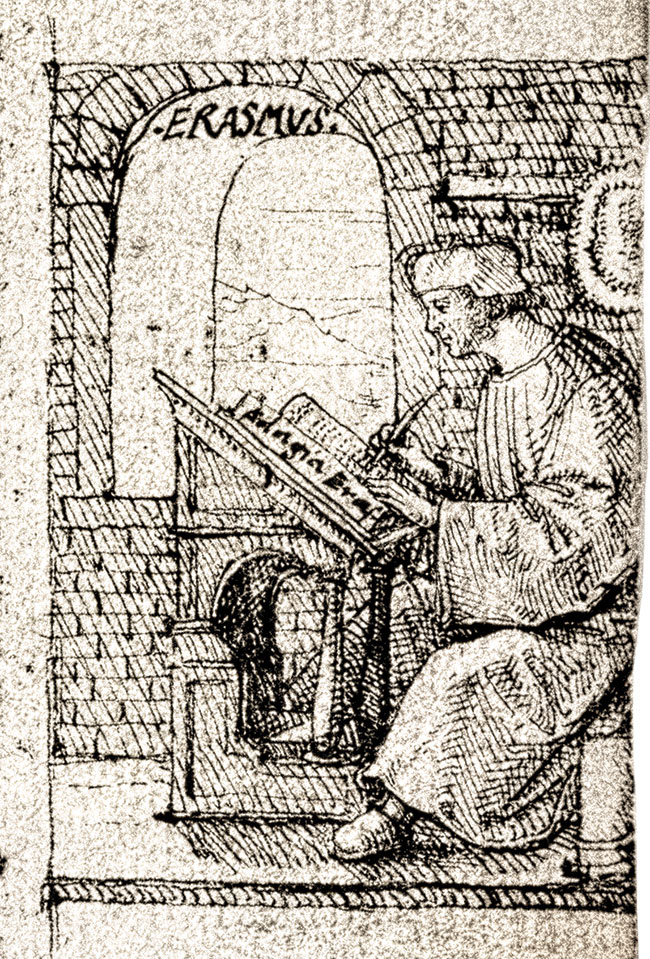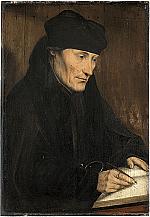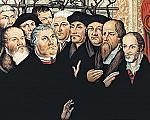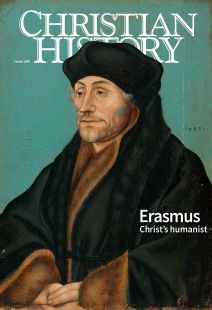Erasmus’s wisdom and wit

[Hans Holbein the Younger, Marginal drawing: “A Scholar at his Desk” in Praise of Folly printed by Johann Froben, 1515. Feather pen in black ink—Public domain, Kunstmuseum Basel]
English translation of Erasmus’s works happened fairly early, and we present some older translations here as historically interesting and influential in their own right.
Nor is it without ground that fools are so acceptable to God. The reason perhaps may be this, that as princes carry a suspicious eye upon those that are over-wise, and consequently hate them . . . Christ ever abhors and condemns those wise men and such as put confidence in their own wisdom. . . .
Throughout the Gospel you find him ever accusing the Scribes and Pharisees and doctors of the law, but diligently defending the ignorant multitude (for what other is that “Woe to ye Scribes and Pharisees” than woe to you, you wise men?), but seems chiefly delighted in little children, women, and fishers.
Besides, among brute beasts he is best pleased with those that have least in them of the foxes’ subtlety. And therefore he chose rather to ride upon an ass when, if he had pleased, he might have bestrode the lion without danger. And the Holy Ghost came down in the shape of a dove, not of an eagle or kite. Add to this that in Scripture there is frequent mention of harts, hinds, and lambs; and such as are destined to eternal life are called sheep, than which creature there is not anything more foolish. . . . And yet Christ professes to be the shepherd of this flock and is himself delighted with the name of a lamb; according to Saint John, “Behold the Lamb of God!” . . .
And Christ himself, that he might the better relieve this folly, being the wisdom of the Father, yet in some manner became a fool when taking upon him the nature of man, he was found in shape as a man; as in like manner he was made sin that he might heal sinners.
Nor did he work this cure any other way than by the foolishness of the cross and a company of fat apostles, not much better, to whom also he carefully recommended folly but gave them a caution against wisdom and drew them together by the example of little children, lilies, mustard seed, and sparrows, things senseless and inconsiderable, living only by the dictates of nature and without either craft or care. —From Praise of Folly, translated by John Wilson, 1668
A fair manner of teaching [young children] shall cause that it may seem rather a play than a labor, for here the age must be beguiled with sweet flattering words, which yet cannot tell what fruit, what honor, what pleasure learning shall bring unto them in time to come. And this partly shall be done by the teacher’s gentleness and courteous behavior, and partly by his wit and subtle practice, whereby he shall devise diverse pretty means to make learning pleasant to the child. . . . For there is nothing worse than when the waywardness of the master causes the children to hate learning before they know wherefore it should be loved. The first degree of learning is the love of the master. In process of time it shall come to pass that the child which first began to love learning for the master’s sake afterwards shall love the master because of learning.—From On the Education of Children, translated by Richard Sherry, 1550
[From a list of forms of polite salutations intended as Latin exercises for schoolchildren]
To guests: Happy be this Feast. Much good may it do all the Company. I wish all Happiness to you all. God give you a happy Banquet.
To one that sneezes: May it be lucky and happy to you. God keep you. May it be for your health. God bless it to you.
To one that is about to begin any business: May it prove happy and prosperous for the public good. May [what] you are going about be an universal Good. . . . May Christ in Heaven prosper what is under your Hand. May what you have begun end happily. May what you are set about end happily. . . . I wish that this New Year may begin happily, go on more happily, and end most happily to you, and that you may have many of them, and every year happier than another.—From Colloquies, translated by N. Bailey, 1725
By Erasmus
[Christian History originally published this article in Christian History Issue #145 in 2022]
Next articles
Christian History timeline: Erasmus the traveling humanist
Where he went, who his friends were, who argued with him, who read his books
the editorsSupport us
Christian History Institute (CHI) is a non-profit Pennsylvania corporation founded in 1982. Your donations support the continuation of this ministry
Donate







